Esports Betting Engagement: The Complete Operator's Guide to Gen Z Players
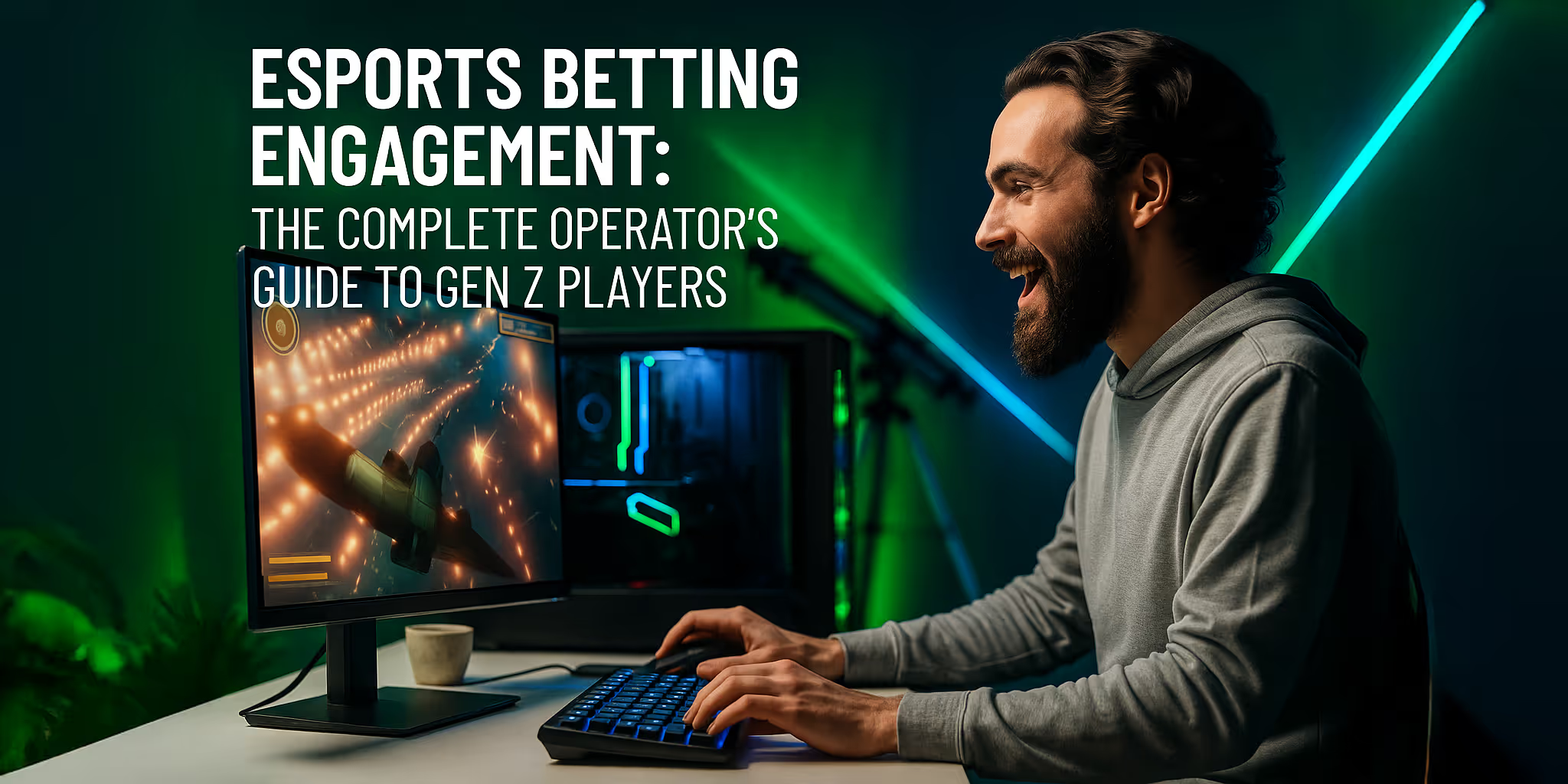
You'd think understanding Gen Z would be simple – just throw some TikTok videos their way and call it a day, right? Not quite. Gen Z players aren't just younger millennials with better phones. They're fundamentally different creatures who grew up in a world where the internet was always there, streaming was normal, and social connections happened through screens just as much as in person.
Apart from constantly consuming content, they also live inside it. When a Gen Z player watches an esports match, they're not passively sitting back like someone watching Sunday football. They're chatting in real-time, predicting outcomes, sharing moments, and making connections with other viewers across the globe. Their entire entertainment diet revolves around interactive, community-driven experiences.
Gen Z consumers spend about 25% of their leisure time playing video games, making it their top activity. Compare that to just 18% on social media and 17% streaming video content. Also, 70% of Gen Z and Gen Alpha gamers prefer games with built-in social features like multiplayer modes, chat functions, and friend lists.
The Social Betting Revolution That's Changing Everything

Traditional sportsbooks feel ancient to Gen Z players. The old model of placing a bet, waiting hours for results, and celebrating or mourning in isolation doesn't match how this generation experiences entertainment. They want betting that feels social, interactive, and connected.
Social betting platforms are answering this call by creating communities around wagering. Instead of betting against the house, players can bet directly with each other. They can share their bets, follow successful players, and participate in real-time discussions about matches and strategies. It's peer-to-peer betting with extensive community features like chat functions, activity feeds, and user networks.
The appeal goes beyond just the social aspect. Social betting platforms often eliminate the traditional "vig" or house edge, offering better odds and higher returns. They're accessible in more states than traditional sportsbooks (40+ vs. ~20) and allow the use of virtual currencies alongside real money.
What really sets social betting apart is how it transforms wagering from a solitary activity into a shared experience. Players can track their performance against friends, participate in group challenges, and learn from other bettors' strategies. It's betting reimagined for a generation that expects everything to be social and interactive.
Streaming Integration: Where the Action Really Happens

Gen Z-ers do more than just watch esports – they live in streaming environments. Twitch, YouTube Gaming, and Discord aren't just platforms to them; they're digital homes where they spend hours each day. Smart operators are recognizing this and building betting experiences directly into streaming environments.
The most innovative platforms are using API integrations with streaming sites so users can bet without ever leaving their streams. Some websites even embed directly into popular streaming platforms, allowing viewers to place bets while watching matches unfold in real-time.
This streaming-first approach makes perfect sense when you consider that over 21.4 billion hours of gaming content was consumed on Twitch alone in 2023. Gen Z players are already spending massive amounts of time in these environments – bringing betting to them feels natural rather than forcing them to jump between platforms.
Live betting during streams creates an entirely different energy. Players can react to momentum shifts, place in-game bets based on what they're seeing happen, and share those moments instantly with the chat community. It's fast, social, and perfectly matched to how Gen Z consumes content.
The Psychology Behind Gen Z Betting Behavior
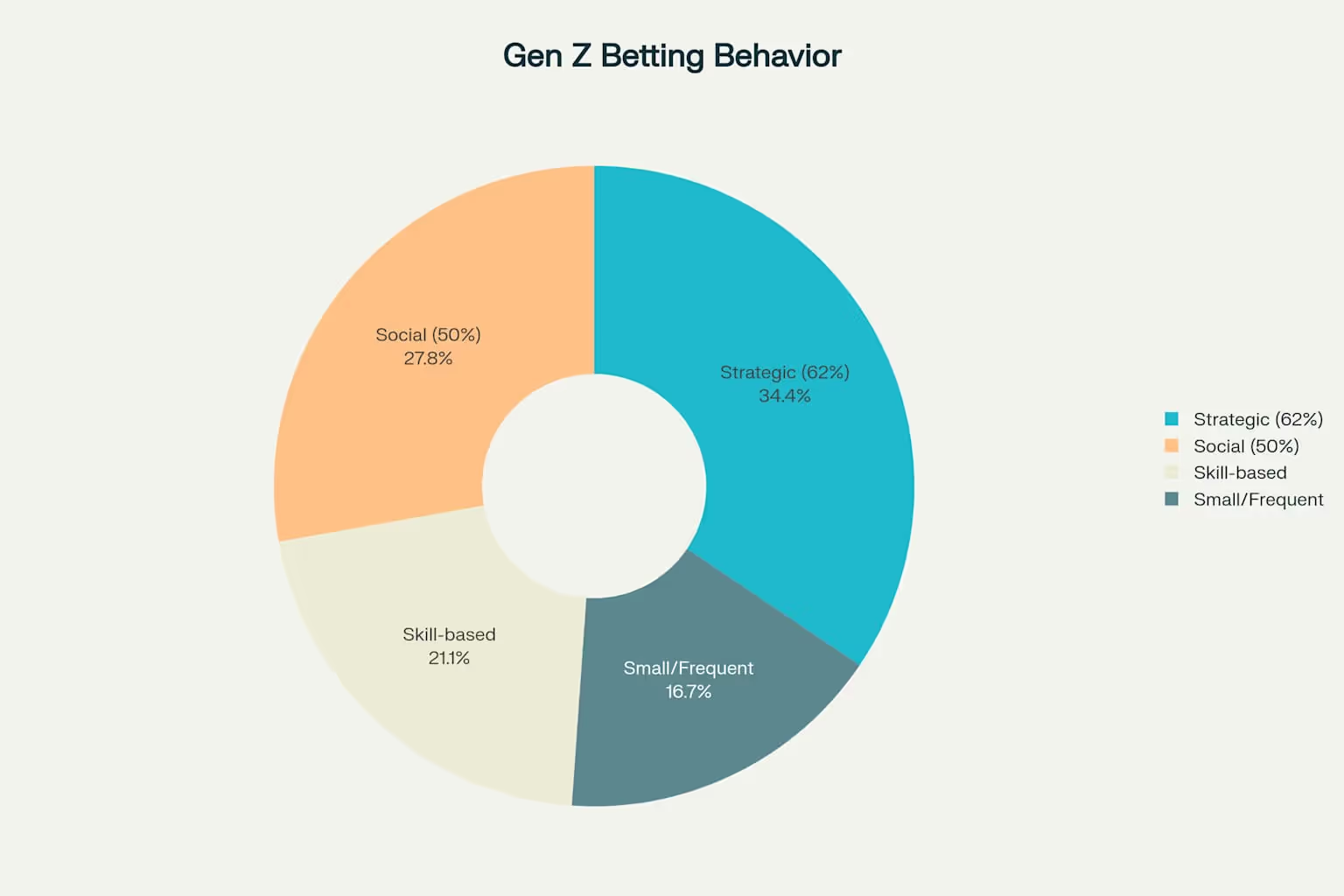
Understanding why Gen Z bets the way they do requires looking beyond just demographics. This generation approaches risk differently than older players, often preferring smaller, more frequent bets rather than large, infrequent wagers.
Research shows that 62% of Gen Z tend to bet in ways that increase their chances of winning rather than taking big risks. They're strategic about their betting, often using it as a way to engage more deeply with the esports they love rather than purely for monetary gain.
{{cta-banner}}
Gen Z players also view betting as a form of skill expression. Unlike traditional sports betting where knowledge gaps exist between casual and serious fans, many Gen Z players have been gaming for years. They understand team dynamics, player strengths, and meta changes in ways that give them confidence in their betting decision.
The social aspect can't be overstated. For 54% of millennials and 50% of Gen Z, sports betting provides a way to engage with their favorite teams and players. It's all about feeling connected to the competition and having a stake in the outcome.
7 Essential Features Gen Z Players Actually Want

1. Real-Time Social Integration
Gen Z players expect to share everything instantly. Betting platforms need built-in social feeds, easy sharing options, and the ability to follow other players' strategies. Half of Gen Z say they hang out with other people in games without even playing them – your betting platform should facilitate similar social connections.
2. Mobile-First Design
This generation lives on their phones. Any betting platform that doesn't work seamlessly on mobile is dead in the water. More than that, the mobile experience needs to feel native and intuitive, not like a desktop site crammed onto a small screen.
3. Transparent, Community-Driven Odds
Traditional bookmaker odds feel opaque and manipulative to Gen Z players. They prefer peer-to-peer betting models where they can see how odds are formed and influenced by community behavior rather than hidden algorithms.
4. Streaming Platform Integration
Your betting platform should work within the streaming environments where Gen Z already spends time. API integrations with Twitch, YouTube Gaming, and Discord aren't nice-to-haves, but essential for reaching this audience where they live.
5. Gamification Elements
Points, achievements, leaderboards, and progression systems resonate strongly with a generation raised on video games. These elements should feel meaningful and tied to actual skill development, not just arbitrary rewards.
6. Educational Content That Doesn't Condescend
Gen Z players want to understand betting strategies and market dynamics, but they hate being talked down to. Content should be informative, accessible, and created by people who clearly understand both esports and betting.
7. Fast, Flexible Payment Options
Traditional banking feels slow and cumbersome to Gen Z. Cryptocurrency options, digital wallets, and instant transfers aren't just conveniences – they're expectations for a generation that's used to everything happening immediately.
Building Trust With the Most Skeptical Generation

Gen Z might be digital natives, but they're also remarkably skeptical of corporate messaging and traditional advertising. They can spot inauthentic marketing from a mile away and have zero patience for brands that try too hard to be cool.
Building trust starts with transparency. Be clear about how odds work, what fees you charge, and how user data is handled. Gen Z players expect detailed information and get suspicious when important details are hidden or unclear.
Community building matters more than traditional advertising. Gen Z players trust recommendations from other players more than any marketing campaign. Focus on creating genuine communities around your platform where users can share experiences and strategies.
Authenticity in communication is crucial. Skip the corporate speak and write like a human being. Use humor when appropriate, admit when you don't know something, and avoid overpromising. Gen Z players prefer brands that feel real over those that try to appear perfect.
Content Strategy That Actually Connects
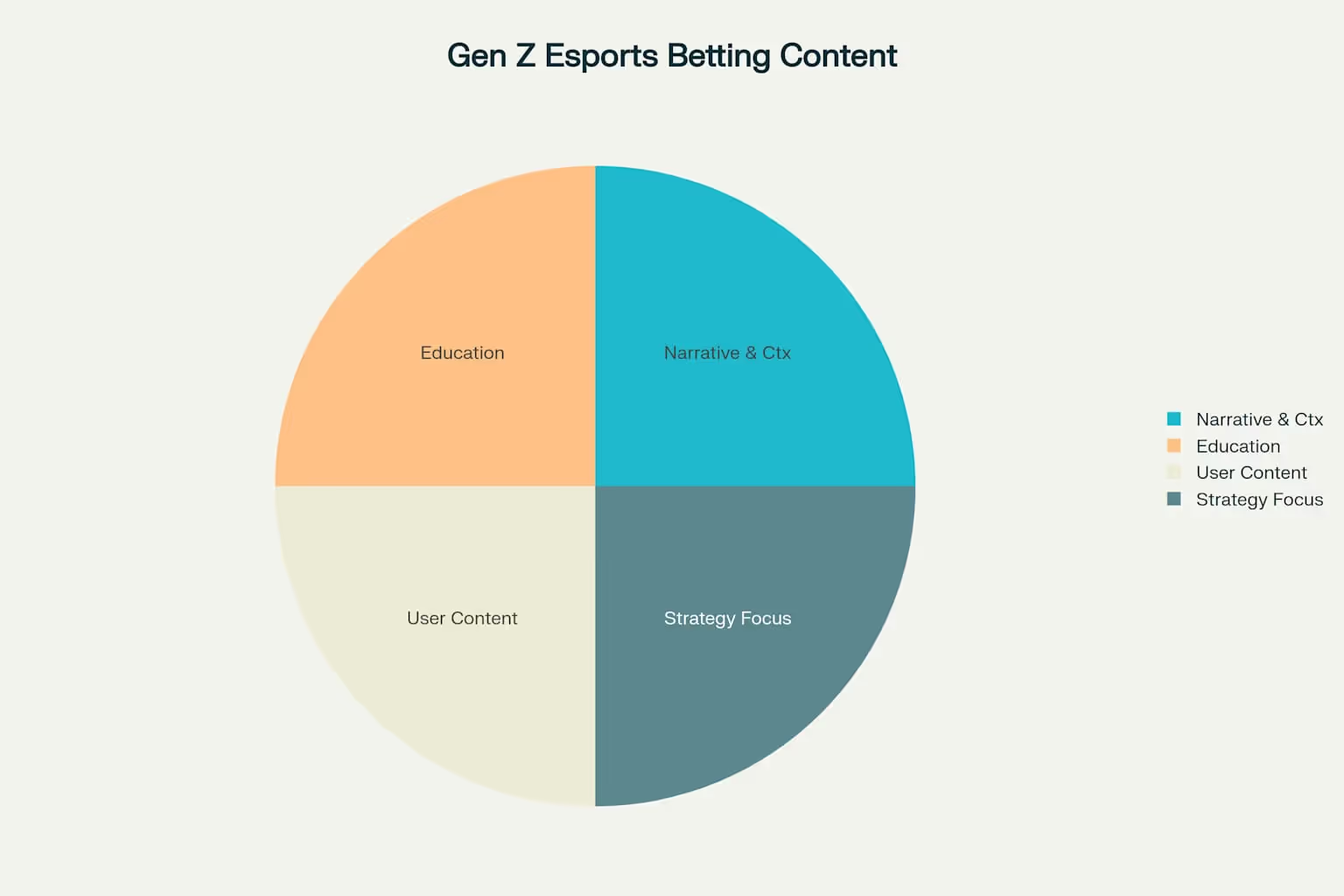
Traditional sports betting content focuses heavily on predictions and tips. While Gen Z players appreciate strategic insights, they're more interested in content that helps them understand the broader context of what they're betting on.
Create content that explains the stories behind esports matches. Who are the players? What's the team drama? How have these organizations evolved? Gen Z players love narrative and context – they want to feel connected to the personalities and storylines, not just the odds.
Educational content performs well when it's genuinely helpful rather than promotional. Break down complex betting concepts, explain market movements, and help players develop their own analytical skills. The goal is to make your audience better bettors, not just more frequent ones.
User-generated content resonates strongly with Gen Z. Showcase successful betting strategies from your community, highlight interesting predictions, and amplify the voices of knowledgeable players. This generation trusts peer recommendations over brand messaging.
Live Betting: The Real-Time Engagement Hook
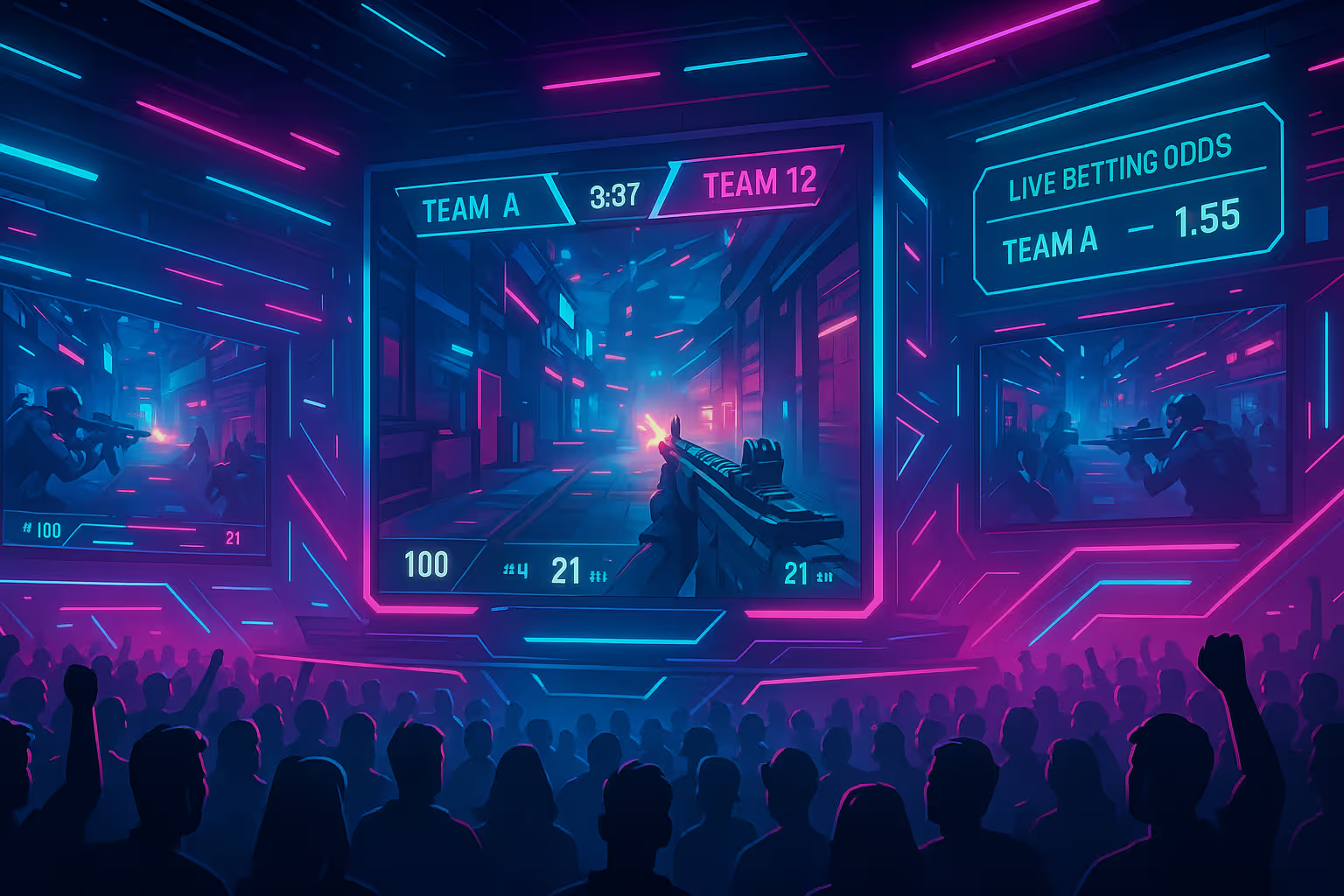
Live betting perfectly matches Gen Z's preference for immediate, interactive entertainment. This generation doesn't want to place a bet and wait hours for results, but to be actively engaged throughout the entire match.
The key is making live betting feel like a natural extension of watching esports rather than a distraction from it. Odds should update smoothly, betting options should be clearly explained, and the interface shouldn't obstruct the viewing experience.
In-game betting markets should reflect actual esports dynamics. Beyond simple match winners, offer bets on specific rounds, first objectives, player performance metrics, and other outcomes that esports fans actually care about and can predict based on their game knowledge.
Real-time data visualization helps Gen Z players make informed decisions quickly. Show momentum shifts, player statistics, and team performance metrics in ways that enhance understanding rather than overwhelming with information.
Community Features That Keep Players Coming Back

Building genuine community takes more than just adding a chat feature. Gen Z players want spaces where they can develop relationships, share knowledge, and grow together as bettors.
Leaderboards and rankings satisfy the competitive nature of this generation while encouraging continued engagement. But make sure these systems reward skill and knowledge, not just volume of betting or amount wagered.
Discussion forums and strategy sharing create value beyond just placing bets. Players should be able to analyze matches together, share insights about team strategies, and debate predictions in structured environments.
Mentorship programs can connect experienced players with newcomers, creating value for both groups. Veterans get recognition for their expertise while new players get guidance from people who understand their interests and goals.
Mobile Optimization for a Mobile-First Generation

Gen Z players expect Mobile to be their primary experience. Your mobile platform needs to work perfectly because for many players, it's the only version they'll ever use.
One-thumb navigation is essential. Players should be able to access all major functions using just their thumb while holding their phone naturally. Complex multi-step processes that require two hands immediately create friction.
Push notifications need to add value without becoming annoying. Alert players to important match developments, odds changes for followed teams, or social activity from friends. But always give them granular control over what notifications they receive.
Offline functionality helps during network issues or in low-connectivity environments. Players should be able to browse previous bets, check results, and prepare future strategies even when their connection is spotty.
Responsible Engagement for a Generation at Risk
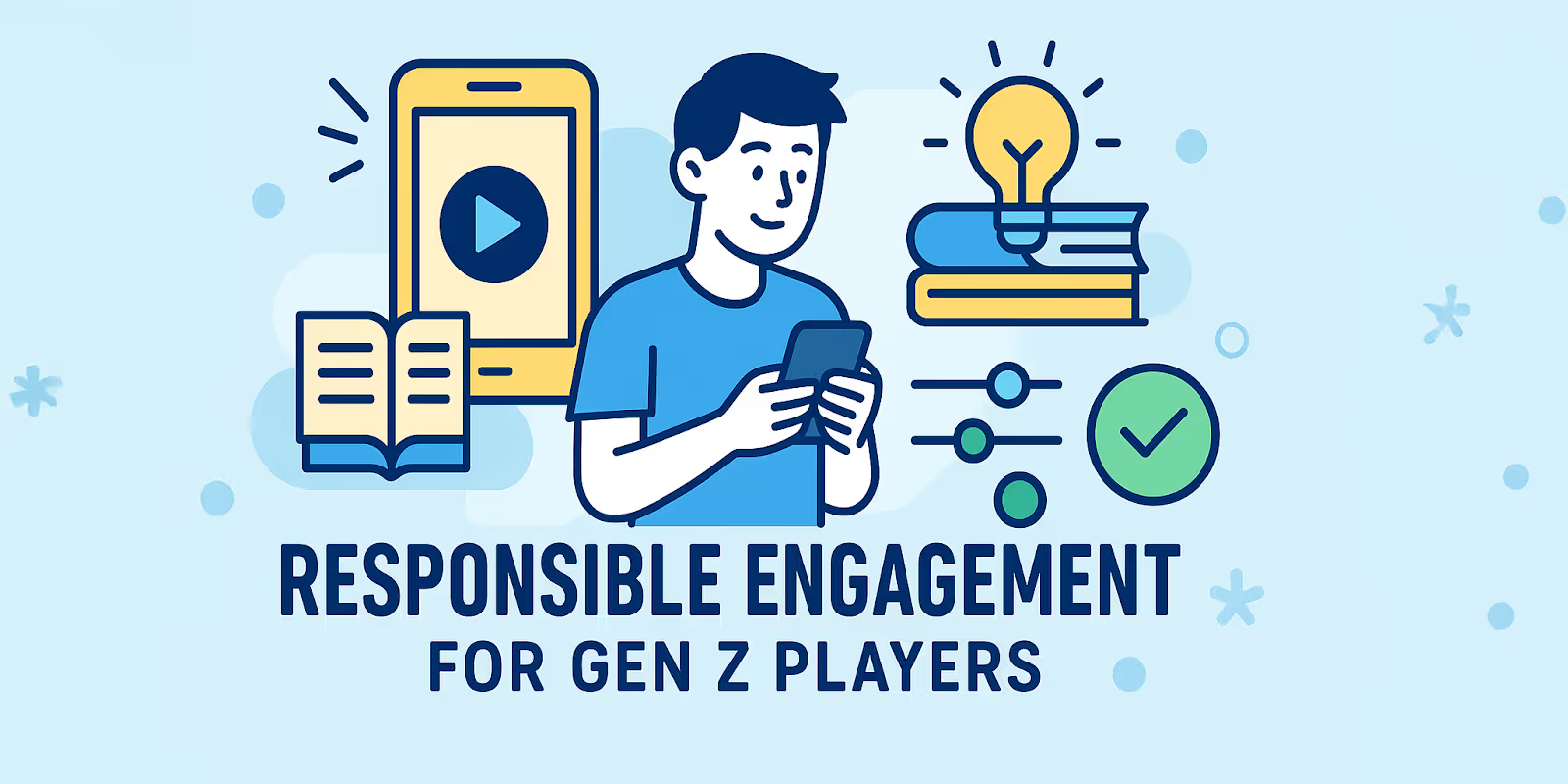
Gen Z players face unique risks when it comes to betting. They're comfortable with digital transactions, often have limited experience with financial risk, and may not recognize problematic betting patterns.
Education should be built into the platform experience rather than relegated to fine print. Help players understand concepts like bankroll management, variance, and the mathematics of betting in ways that feel helpful rather than preachy.
Spending controls need to be easy to set and modify. Gen Z players often appreciate tools that help them stick to their intended spending levels, especially when these tools are presented as performance optimization rather than restriction.
Social features can actually support responsible betting when designed thoughtfully. Communities that celebrate strategic thinking and long-term success create better role models than those that only highlight big wins. And what happens then?
Payment Solutions for Digital Natives
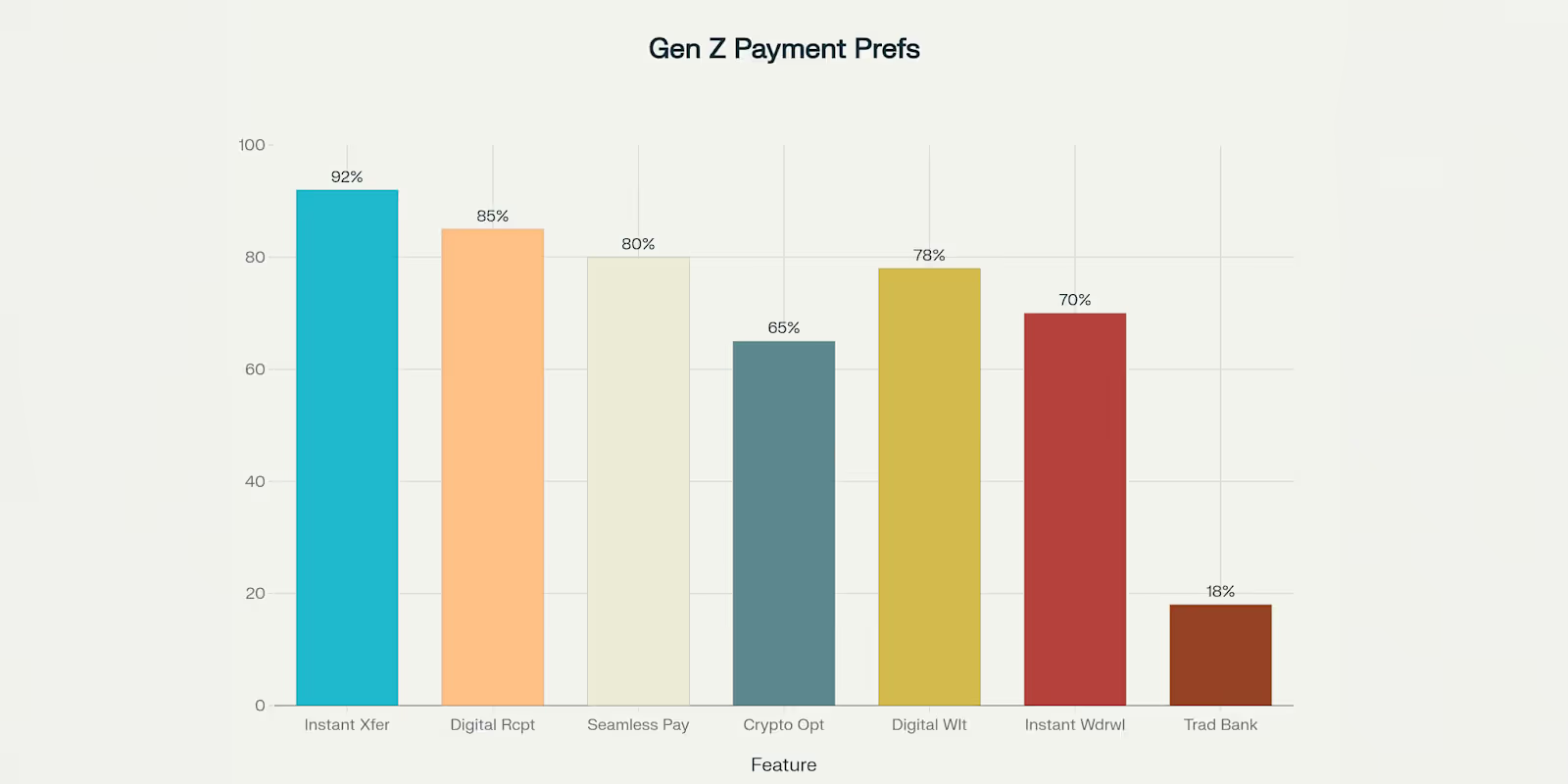
Traditional banking feels antiquated to Gen Z players. They expect instant transfers, digital receipts, and payment methods that work smoothly across all their digital experiences.
Cryptocurrency options appeal to players who value privacy, speed, and lower fees. But integration needs to be simple enough that players don't need deep technical knowledge to use these options effectively.
Digital wallets like PayPal, Venmo, and Cash App feel more natural to Gen Z than credit cards or bank transfers. These platforms already integrate with their daily financial lives and social interactions.
Instant withdrawals, even if they come with small fees, often outweigh slower free options for Gen Z players. This generation values time and convenience over small cost savings.
Data Privacy and Security Expectations
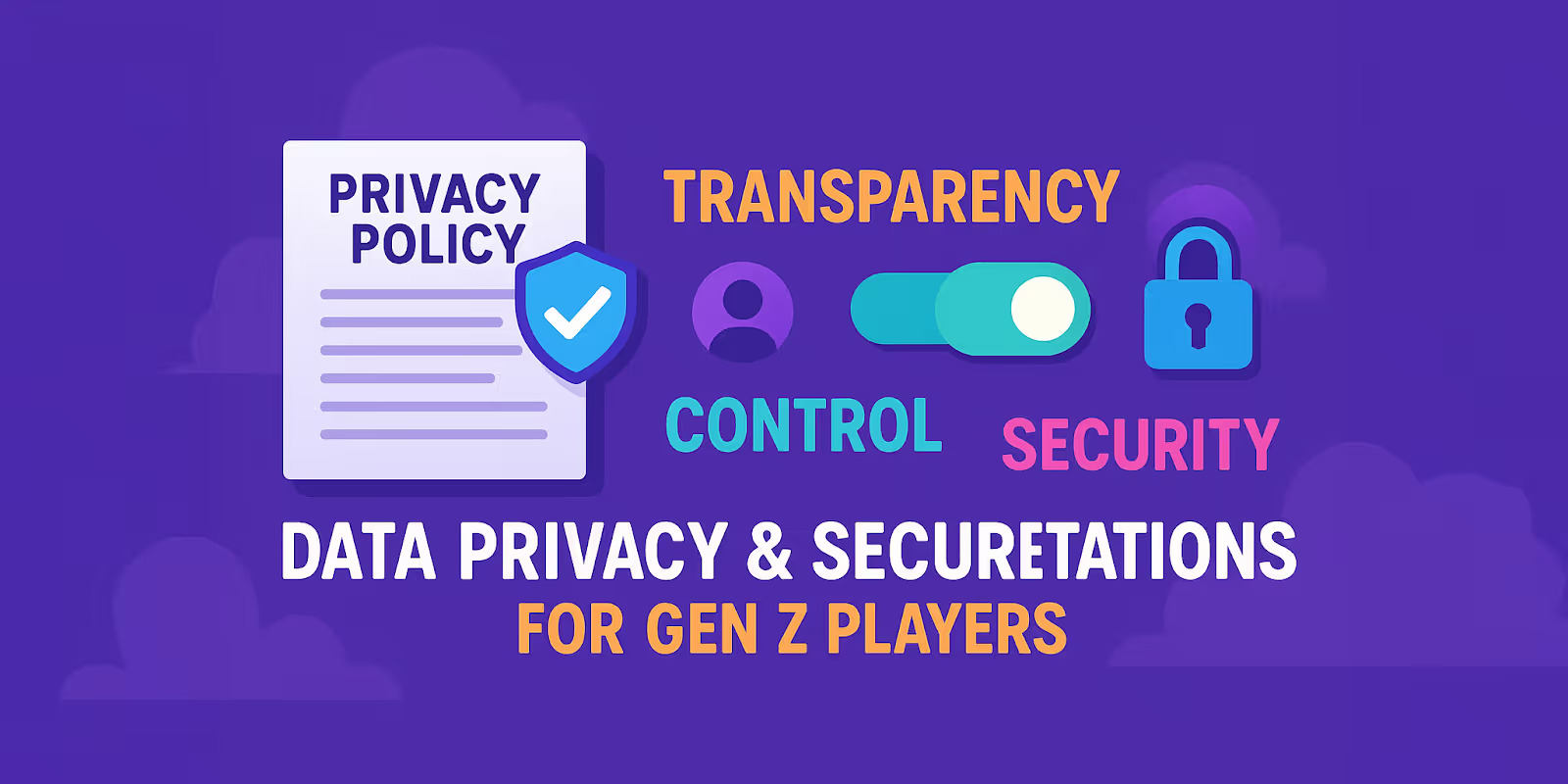
Gen Z players are paradoxically both more willing to share personal information and more concerned about how it's used. They expect transparency about data collection and control over how their information is utilized.
Clear, readable privacy policies matter more to this generation than legal compliance checkboxes. Explain what data you collect, why you need it, and what you do with it in language that doesn't require a law degree to understand.
User control over data sharing should be granular and easy to modify. Players should be able to opt out of marketing communications, limit data sharing with partners, and delete their accounts completely when desired.
Security communication should be proactive rather than reactive. Explain the measures you take to protect user data and funds in ways that build confidence rather than creating anxiety about potential threats.
Creating Authentic Community Connections

Gen Z players can spot fake community building immediately. They want genuine connections with other players who share their interests and knowledge level.
User verification that doesn't feel invasive helps build trust within the community. Players want to know they're interacting with real people, but they also value privacy and don't want to share unnecessary personal information.
Moderation should focus on maintaining quality discussions rather than heavy-handed censorship. Gen Z players expect community guidelines to be clear, fairly enforced, and focused on preventing harassment rather than controlling opinions.
Community events that bring players together around shared interests create stronger bonds than purely betting-focused activities. Consider tournaments, prediction contests, and educational workshops that celebrate esports knowledge and strategic thinking.
The Role of Influencers and Content Creators

Gen Z players trust content creators and influencers more than traditional advertising, but they're also skeptical of obviously sponsored content. Authentic partnerships with creators who genuinely understand both esports and betting can be powerful, but they need to feel natural rather than forced.
Micro-influencers often have more credibility with niche esports communities than major celebrities. Players who have built followings through genuine expertise and engaging content can be more effective ambassadors than big names without relevant knowledge.
Content collaboration should provide value to the creator's audience rather than just promoting your platform. Help influencers create better content about esports strategy, betting analysis, or community building that naturally showcases your platform's features.
Long-term partnerships work better than one-off sponsorships. Gen Z players can tell when a creator has actually used and understands a platform versus when they're just reading sponsored talking points.
Measuring Success Beyond Traditional Metrics

Gen Z engagement looks different from traditional betting metrics. While revenue and betting volume matter, community health and user satisfaction often predict long-term success better than short-term financial indicators.
Time spent on-platform indicates engagement quality, not just betting frequency. Players who spend time in community features, educational content, and social interactions are more likely to become long-term, valuable users.
Community growth and interaction metrics show whether you're building genuine relationships or just processing transactions. Look at discussion quality, user retention in community features, and organic content creation by your users.
User-generated content creation indicates deep engagement. When players create their own content about your platform, share strategies, or help other users, they're investing in the community's success beyond just their own betting outcomes.
Future-Proofing Your Platform for Emerging Technologies

Gen Z players expect platforms to evolve and adopt new technologies quickly. Staying competitive means anticipating and implementing emerging trends before they become widespread expectations.
Virtual and augmented reality integration will likely become important as these technologies mature. Consider how betting might work within VR environments or how AR could enhance live viewing experiences.
Blockchain and cryptocurrency adoption continues growing among younger players. Having clear strategies for integrating these technologies – whether through payments, NFT rewards, or decentralized betting options – positions you for future trends.
Artificial intelligence and machine learning can elevate user experiences through better recommendations, personalized odds, and improved community matching. But implementation should feel helpful rather than manipulative or invasive.
Smartico.ai: The Complete Solution for Modern Operators
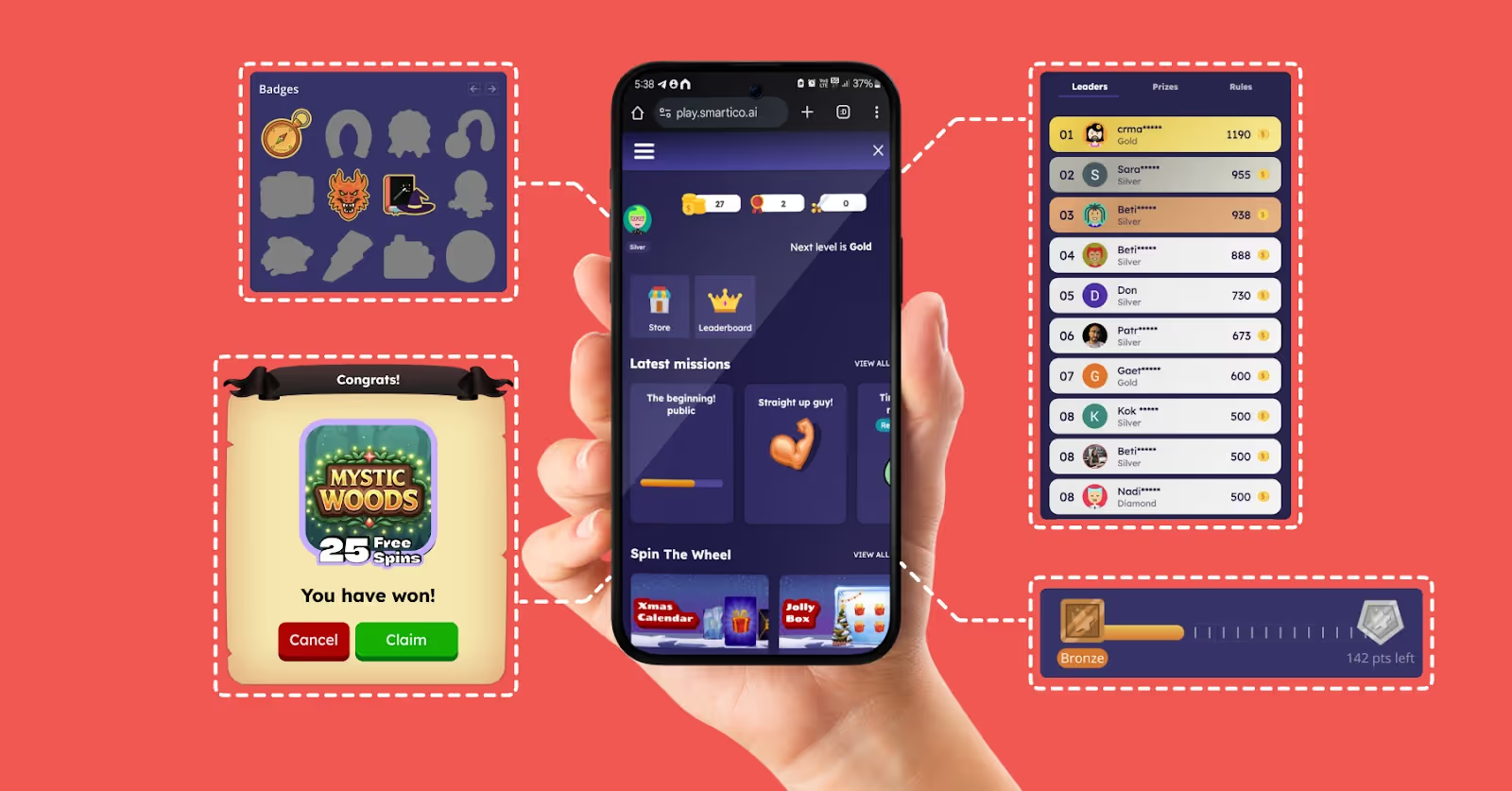
Smartico.ai stands as the first and leading unified Gamification and CRM Automation software in history. The platform combines deep CRM automation with advanced gamification tools, creating a single solution that drives both operational efficiency and customer engagement.
For operators targeting Gen Z players, Smartico offers precisely the tools needed to create engaging, social, and interactive betting experiences. The platform's unified approach means you can manage player journeys, social features, and gamification elements from one central system rather than juggling multiple vendors and integrations.
The CRM automation capabilities help operators understand and respond to Gen Z behavior patterns in real-time. From personalized messaging to automated rewards based on player actions, Smartico provides the kind of responsive, custom experiences that Gen Z players expect.
Smartico's gamification features – including missions, achievements, leaderboards, and social challenges – align perfectly with Gen Z preferences for interactive, game-like experiences. These aren't just surface-level additions but integrated systems that can transform how players engage with betting platforms.
What sets Smartico apart is its focus on authentic engagement rather than manipulation. The platform helps operators build genuine communities and reward meaningful player behaviors, creating sustainable growth through player satisfaction rather than short-term extraction.
To find out how Smartico can boost the revenue of your business in particular, book your free, in-depth demo below.
{{cta-banner}}
FAQ Section
- How does Gen Z betting behavior differ from older generations?
Gen Z players prefer smaller, more frequent bets rather than large wagers. They bet strategically to increase winning chances rather than taking big risks, and they use betting as a way to engage more deeply with esports they already follow and understand. - What makes social betting appealing to Gen Z players?
Social betting matches Gen Z's preference for community-driven experiences. They can bet with peers rather than against bookmakers, share strategies, follow successful players, and participate in real-time discussions about matches and outcomes. - Why is streaming integration crucial for reaching Gen Z?
Gen Z spends massive amounts of time in streaming environments like Twitch and Discord. They prefer betting experiences integrated into platforms where they already spend time rather than having to switch between separate applications. - What payment methods do Gen Z players expect?
Gen Z players prefer instant, digital payment options including cryptocurrency, digital wallets like PayPal and Venmo, and mobile payment systems. Traditional banking feels slow and cumbersome to this generation. - How important is mobile optimization for Gen Z betting platforms?
Mobile isn't just important, but also the only experience most Gen Z players will use. Platforms need one-thumb navigation, fast loading times, and full functionality on mobile devices rather than simplified mobile versions. - What type of content resonates with Gen Z bettors?
Gen Z players want educational content that helps them understand betting strategies and market dynamics without being condescending. They prefer content that explains stories behind matches and helps them develop analytical skills. - How can op where users share experiences rather than relying on traditional advertising. Authenticity in communication matters more than polished marketing.
- What role does gamification play in Gen Z engagement?
Gamification elements like achievements, leaderboards, and progression systems strongly appeal to Gen Z players raised on video games. But these features must feel meaningful and tied to skill development rather than arbitrary rewards. - How do operators build trust with skeptical Gen Z players?
Transparency about odds, fees, and data usage is essential. Focus on building genuine communities
Did you find this article helpful? If so, please consider sharing it with other industry professionals such as yourself.
Ready to use Smartico?
Join hundreds of businesses worldwide engaging players with Smartico.










